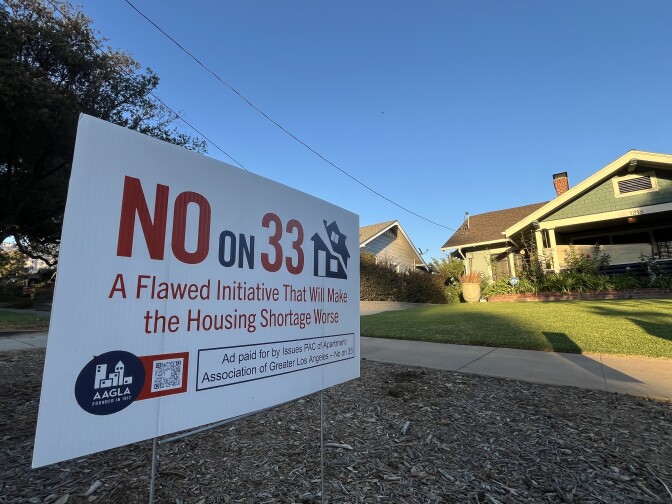You know election season is heating up when you start seeing lawn signs — everywhere.
Tensions are running high in many races. In some cases, those tensions are playing out between landlords and tenants who disagree on key issues facing California voters this November.
Take the hotly contested statewide proposition on expanding rent control. One LAist reader asked:
My landlord put up an election-related sign in the yard of the single-family home I rent (the sign says "Vote No on Prop 33"). Do I have any say in whether I want the sign to be there or not?
The short answer is… There are no laws in California stopping landlords from placing signs outside properties they own, even in the yard of a single-family home where the tenants don’t support the message.
This is the answer LAist got after reaching out to real estate experts, tenant advocates and landlord groups. We also talked to the campaigns for and against Prop. 33. They all agreed that a landlord can place a campaign sign in the yard of their tenants’ home. This is true not just for local and state issues, but even in this highly contentious presidential race.
One possible solution: Check your lease
Javier Beltran, deputy director of the L.A.-based Housing Rights Center, said the only exception might be found in the fine print of a lease.
“There may be something in their lease, not specific to political signage, but at least to change in the character of the yard,” Beltran said.
If a lease specifically says tenants have full use of the yard, or are responsible for its maintenance, that could give tenants grounds to remove the sign.
“That may be something the tenants could use in regards to saying, ‘Hey, I don't want that sign here,’” Beltran said.
But if the lease is silent on who maintains control over the yard, it’s unclear what tenants can do about an unwelcome campaign sign, he said.
Try to raise concerns with your landlord

Fred Sutton — spokesperson for the California Apartment Association, a landlord advocacy group that is also the top funder of the No on 33 campaign — said tenants should try to start a conversation if they’re uncomfortable with a sign put up by their landlord.
“We always encourage residents to reach out to their housing provider first whenever they have any concerns about the property,” Sutton said. “Open communication is the best first step in addressing any issues.”
Landlords can’t force tenants to remove signs
If landlords aren’t responsive to their concerns, tenants could always try another approach: putting up their own, competing sign.
Beltran notes that section 1940.4 of California state law prohibits landlords from stopping tenants who want to put up a campaign sign in their window or on the door of their unit.
“You could just put another sign there, countering it,” Beltran said. “That would kind of confuse everybody, but at the same time, at least it puts the tenant at ease.”
Why this issue hits home for single-family renters
Lawn signs can be a tricky issue for tenants renting single-family homes. For large apartment buildings, it’s not always clear who exactly placed a sign in the front yard. But for single-family homes, neighbors are likely to assume signs were put up by the people living there — leaving renters in an awkward position if they disagree with a sign’s message.
The outcome of Prop. 33 could also spell big changes for landlords who rent out single-family houses, and the tenants who live in those homes.
Under a 1995 state law, cities in California are currently allowed to impose rent control on apartment buildings, as long as those properties were built before 1995 (the cut-off is even earlier in some cities). But that law restricts local governments from imposing annual rent hike limits on single-family homes. If voters pass Prop. 33, this state law would be repealed, opening the door for cities to expand rent control to single-family homes.












